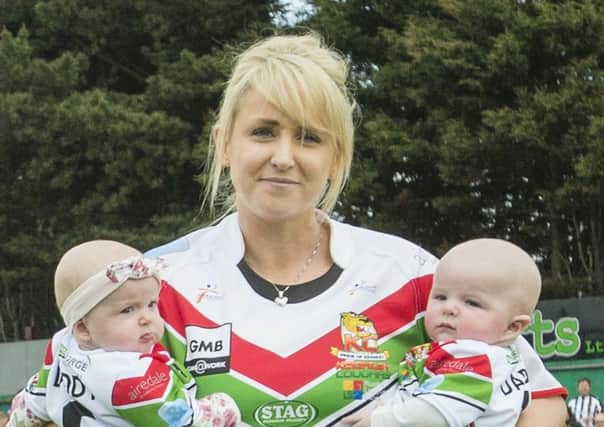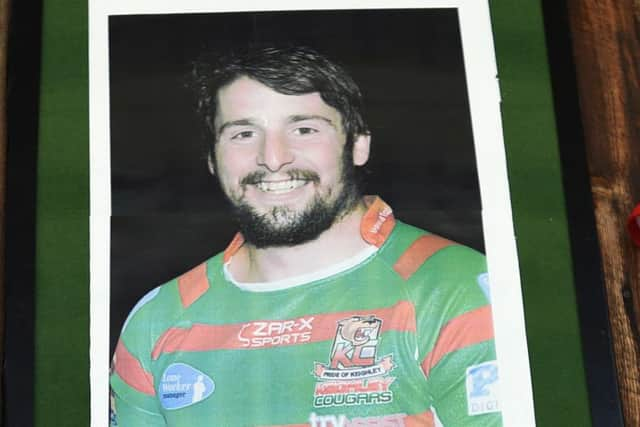Rugby widow pledges support for research campaign


The widow of rugby league player Danny Jones is backing a campaign for more research into the inherited condition which killed her husband.
Lizzie Jones’ husband Danny died last May of a sudden cardiac arrest while playing for Keighley Cougars.
Advertisement
Hide AdAdvertisement
Hide AdThe professional singer has shown tremendous courage since Danny’s death, including singing Abide with Me before the kick of the Challenge Cup final in Wembley and an emotional performance of Danny Boy at the BBC’s Sports Personality of the Year Awards.


Now the mother of baby twins, Bobby and Phoebe, is in the spotlight again, this time backing research into the disease which killed her 29 year old husband so suddenly.
“I knew I was going to marry Danny from the first time we went out. Losing him that day devastated our family. It just didn’t occur to me that a seemingly fit and healthy athlete like Danny could ever be struck down with a heart condition. It goes to show that it can happen to anyone,” says Lizzie.
“Raising our twins without Danny is hard. In future, they will be tested for the inherited condition that Danny died of. I just hope that by telling Danny’s story, more support will be given to finding new treatments for these conditions that could one day benefit my children.”
Advertisement
Hide AdAdvertisement
Hide AdThe British Heart Foundation estimates that more than 6,000 people are born each year in the UK with a genetic fault that puts them at a high risk of suffering from an inherited heart condition, which could lead to a heart attack or cardiac arrest.The heart charity says that in the UK as many as one in 120 people are born with the faulty gene that puts them at risk of potentially deadly conditions including hypertrophic cardiomyopathy and familial hypercholesterolemia. This means that in the UK as many as half a million people are living with one of these genetic defects.


For some – including high profile sports people such as Danny Jones – there is no warning before the underlying condition causes a sudden cardiac arrest. Research has suggested that each week in the UK 12 apparently fit and healthy people aged 35 and under die of an undiagnosed heart condition.
Despite advances in research into inherited heart conditions, many gene defects still remain undiscovered. The BHF say that identifying those defects is the first step towards developing improved genetic tests to identify people at risk so that they can be treated.
The BHF is raising awareness of the death and suffering that heart disease causes for people of all ages, and says far more research is needed to improve diagnosis and treatment.
Advertisement
Hide AdAdvertisement
Hide AdAn inherited heart condition can span generations: someone living with certain types of inherited heart condition has a 50:50 chance of passing it onto their children. These genetic faults can lead to heart muscle diseases called cardiomyopathies, heart rhythm disorders and familial hypercholesterolemia, a condition which causes abnormally high cholesterol that can lead to a heart attack at a young age.
Professor Peter Weissberg, Medical Director at the British Heart Foundation, said: “We urgently need to accelerate research into inherited heart conditions that take the lives of hundreds of young people in the UK every year, often without warning.
“Our research has helped make great progress in identifying some of the gene defects that cause these heart conditions, and as a result genetic testing is now available for many people with a family history of an inherited heart disease. However, many of the causative defects remain undiscovered. We urgently need people’s support to enable us to fund more research into these gene defects so that patients at risk can be identified before they have a serious cardiac event and so that we can work towards developing treatments to neutralise the effects of the faulty gene.” The most common cause of sudden unexpected death in childhood and in young athletes is a condition called hypertrophic cardiomyopathy (HCM). It is estimated that 120,000 people are living with HCM in the UK, most of whom are undiagnosed.
However, research led by BHF Professor Mathias Gautel from King’s College London, is helping to discover how changes in genes can lead to faulty heart proteins that can cause the condition. Professor Gautel and his team are using state-of-the-art technologies to discover how changes to specialised proteins which create the heart’s powerful contractions can cause the heart to fail.
For more information visit: www.bhf.org.uk